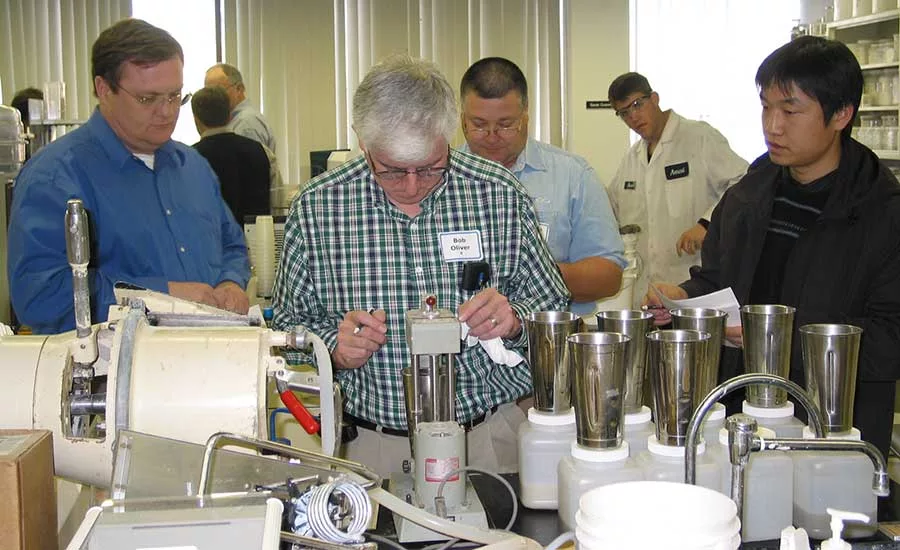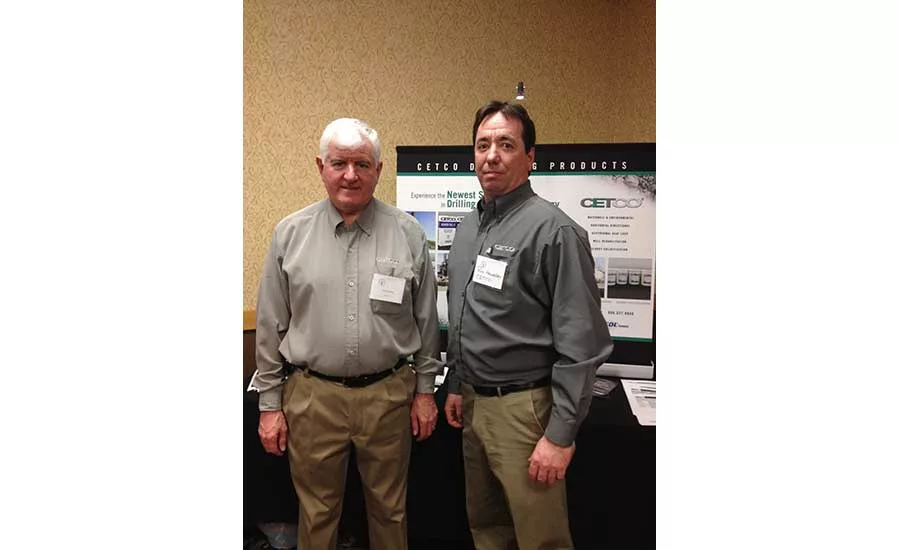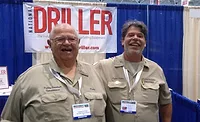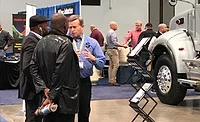Longtime Columnist and Drilling Fluids Sales, Support Rep Retires

Drilling Fluids columnist Bob Oliver retired last month from CETCO Drilling Services. Source: Bob Oliver

From the jobsite to the lab to the classroom, Oliver has worked to educate owners, operators and mud men about the value of using the right materials to get the job done. Source: Bob Oliver

Bob Oliver and Rick Hennessey represent CETCO Drilling Products at a recent North Dakota Well Drillers Association event. Source: Bob Oliver
Readers of National Driller will instantly recognize the name Bob Oliver. To us, he’s one of a handful of regular writers for our Drilling Fluids column. But in the Northwest United States, he’s been the go-to man for sales and support for drilling fluids, additives, polymers and foams for CETCO Drilling Products. Oliver retired last month after 48 years of service in the name of bentonite, first with American Colloid Company and later with CETCO. We got him on the phone to see what parting thoughts he might have for our readers.
Our interview is edited for space and clarity.
Q. You have decades in sales and support in the drilling industry. Broadly speaking, what are some of the major changes you’ve seen in that time?
A. That’s kind of a tough one, I guess. I’ve seen a lot of product changes. We and our competitors have added a number of different types of products, especially in water well grouting. We have the Nebraska grout study, and that brought about some changes and some improvements to grouting. Also, there has been a lot of changes in drilling fluids, too, a lot of additives we didn’t have before that have enhanced our bentonite drilling market.
Q. What major changes turned out differently than you expected?
A. No, I think that the changes that we’ve had have been positive ones. There have been products brought to the market that didn’t work and have been pulled out of the market, too. But, for the most part, the products have worked pretty much the way we would have expected.
Q. You’re a technical support veteran. Without naming names, can you tell us about an unusual problem or situation you helped a drilling contractor through?
A. One of the success stories that I’m aware of, we have agricultural wells that have a tendency to build up mineral scale. We have a product for taking that scale away, or removing it. We had a real success story on the Columbia River out in Oregon where we had a large Ag well that had been pumping 1,850 gpm when it was new. It had gotten so corroded, so scaled that it had gone down to 50 gpm. A contractor there in the area took our product for mineral scale removal and used it, and was able to return that well’s output to the 1,850 gpm. That’s probably been seven or eight years ago now and, as far as I know, that well is still pumping at that 1,850 gpm. That’s one area that has really been great, and there have been a number of instances where drilling mud or the additives we have for it have made a big difference in getting a hole completed.
Q. Beyond that, what are a few common mistakes drillers make on the job that you see over and over?
A. Not making use of the products that are available to them. We do mud classes around the U.S., and around the world actually, where we teach them how to prepare their makeup water and which products to use for which soil conditions that they encounter. Oftentimes, they forget what they learned and they don’t do that, particularly with makeup water. We recommend additions of soda ash to increase the pH to where it makes bentonite and polymers work better. It’s very hard to get them to do that, but we keep working on it in the education and in the articles we write and so on.
Q. What kind of conditions do you see in the Northwest that distinguish it from other parts of the country, as far as the types of products that people might use?
A. The Northwest in the past has been more air drilling than mud rotary. Of course, with air drilling you use foam and some of our other products. Not that they don’t use it in other areas of the country, but they probably use more of it in the Northwest. In the last few years, there have gotten to be more and more mud drillers, and so we’re seeing more mud drilling in the Northwest than what we have in the past. I suppose the use of air drilling and foam is more unique to the Northwest than it is in other areas.
Q. What does the next 10 years look like for the drilling muds and drilling fluids industry?
A. I would expect water well to remain fairly balanced the way it is now. I would see increased business in horizontal directional drilling and in foundation work, those types of markets. I think there will be probably an increased look at well rehabilitation and the products that are available there, versus the price of drilling a new well.
Q. I often hear about the “greying” of the workforce in the drilling trades and support companies like CETCO. As you retire, what do you think companies can do to find and retain younger workers?
A. I suppose that probably education so that they understood what we do and what’s available and the attractiveness of the industries that we’re in. Those could be factors. It’s true, particularly in the water well industry, where it’s getting to be, like you say, a greying workforce. It seems like there’s not as many younger people with that. But the construction part of the market, there are a lot more young people in that. I think the water well industry has to do some things probably to make it more attractive to younger people.
There’s probably more adventure with the construction industry — more challenging than water well. But water well has its challenges, too. I guess that maybe making advances in the equipment for drilling to make the work easier and faster might make a difference. You know, we have a changing workforce in the country in other industries, too, so it is kind of a challenge to get younger people into some of these markets.
Q. How have you seen the role of “mud man” change in your time in the industry?
A. I think there’s a lot more realization by owners and operators as to how important the mud really is to the success of the drilling operation. That has made the difference. Usually, the newest member of the workforce was assigned the responsibility for the mud. It’s not always the cleanest work, and it’s hard work. That’s part of it, too. I’ve seen more emphasis on the use of “good” mud as to how much of a benefit that is in increasing the efficiency of the drilling operation and increasing profits in the long run.
Q. What advice would you like to pass on to someone just starting out in your industry?
A. My advice would be to take advantage of every education opportunity that they can to put what they learn to practice. All of the bentonite producers have been very good about providing education for contractors. If they take advantage of that, that would be an enormous help for my field.
Looking for a reprint of this article?
From high-res PDFs to custom plaques, order your copy today!



